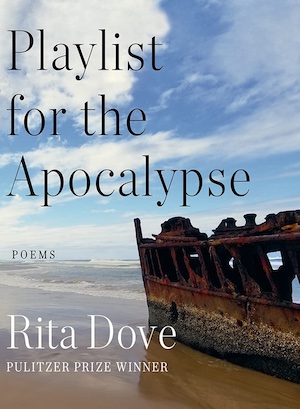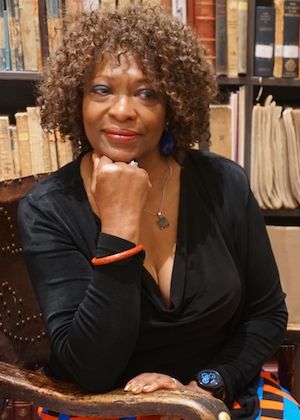By Kaylynne Enloe
Poets evoke emotions in readers by appealing to their senses and setting the scene, a talent Rita Dove is known for. Dove (ΦBK, Miami University) is an author and a poet who has published short stories, essays, a novel, and eleven volumes of poetry. As a Fulbright Scholar she attended Universität Tübingen in Germany, and at the University of Iowa she earned her Master of Fine Arts through Iowa’s Writers’ Workshop. She received a Pulitzer Prize in 1987 for her third poetry collection, Thomas and Beulah (Carnegie-Mellon University Press, 1986). Dove has received several medals throughout her career, including Lifetime Achievement Medals from the Library of Virginia and the Fulbright Association, the National Humanities Medal, the National Medal of Arts, and the 2021 Gold Medal for Poetry. She currently teaches creative writing in the English department at the University of Virginia.
The pandemic gave Dove the time to write an assortment of poems, determining along the way what these poems as a group were trying to tell her. This is how Playlist for the Apocalypse (W. W. Norton, 2021) was created. The collection portrays the current unpredictable times through examinations of historical events set up like a playlist that can soothe a particular mood. Dove stated there was not a singular inspiration for her poems; she had to wait for the poems to come to her, and she knew she wanted to create a companion for readers to carry with them. Dove highlighted that apocalypse does not mean disaster, “it means to reveal something that somehow changes the way you look at your world or your personhood or something that you believed in utterly.” She explained this is how most people felt and continue to feel throughout the pandemic.

Dove had a theme in mind with Playlist for the Apocalypse; “you assemble a playlist . . . some are to make you feel better, some are to make you feel sadder, but it’s a companion, so that’s the way I wanted these poems to be read,” she explained, “just to accompany you through this particular apocalypse.” Dove musically outlines turning points of the past to reflect current times and bring a sense of nostalgia. She depicts intricately detailed and mundane scenes that engage readers by positioning them as if they are witnessing these moments themselves. Her poetry provides an outlet by describing feelings, memories, and settings through vivid descriptions of mortality—American history, assassinations, family reunions, insomnia, medications, food, special occasions, etc. Her writing taps into the emotions of readers through stories from different perspectives and voices from varying eras. She uses her own voice to reflect on her evolving experience living with a chronic illness.
Dove has a strategic method she uses to ensure she never has to force words onto the paper. She separates her poems in different colored folders according to emotion so she knows which poems to draft on a particular day based on how she is feeling. “I tend to work in fragments,” she said. “I’ll write a little bit of one poem; then I might go to another idea or a line or a detail from an observation.” She described this as “a way of kind of letting the poem approach me, as opposed to me chasing it down.” This inspires her to keep writing.
Membership in Phi Beta Kappa feels like an incredible honor, especially to Dove, who said it makes her feel connected to a “thread of history.” She was in awe when she found out she was being inducted into such a revered society. It made her feel believed in. She has also served as a Phi Beta Kappa Senator with the national organization. Dove believes the liberal arts and sciences teach students to think critically and imaginatively, expanding on creative ideas. “I have never met a scientist yet who was not wildly imaginative too,” Dove said. “You have to be able to think outside of the box in order to create a better box.” She explained she’s never known an artist she admires who doesn’t also apply critical thinking to their work, especially when determining which medium would best express their idea or thought.
The arts hold significance, Dove said, because they teach students “not only how to think, but how to imagine something that is not there yet or something that is larger than what we usually operate by.” Dove showcases her endorsement for the arts and sciences by being a member of the American Philosophical Society, the American Academy of Arts and Sciences, and the American Academy of Arts and Letters. She was a chancellor of the Academy of American Poets and president of the Association of Writers and Writing Programs. Dove continues to support how important the arts are to society by taking part in these organizations with artistic missions.
Dove has an impressive artistic portfolio; she wrote a drama called The Darker Face of the Earth (revised in 1996) with shows at the Oregon Shakespeare Festival, the Kennedy Center, and the Royal National Theatre in London. She also wrote Seven for Luck, seven poems accompanied with music by John Williams, as well as A Standing Witness, fourteen poems with music by Richard Danielpour. She also edited weekly poetry columns for The Washington Post (2000-2003) and The New York Times Magazine (2018-2019), among many other works. Art allows artists to express themselves and provides audiences with a connection to the artist with their own interpretations. Dove said the arts “remind us that as individuals, even our deepest most secret emotions can find resonance with a perfect stranger.” This is especially evident in poetry through the imagery and metaphors conjured by poets that relate to audiences in different ways; “we are all part of a larger humanity,” she said. Dove has spent her life expressing herself through the arts and connecting to audiences with her beautiful imagery and realism.
Kaylynne Enloe graduated from Arizona State University in 2020 with a Bachelor of Arts in film and media studies, focusing on film genre and the television industry. She was inducted into ASU’s chapter of Phi Beta Kappa, Beta of Arizona, in May 2021.




